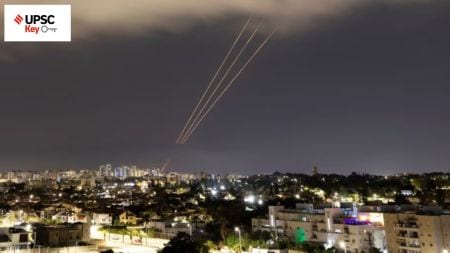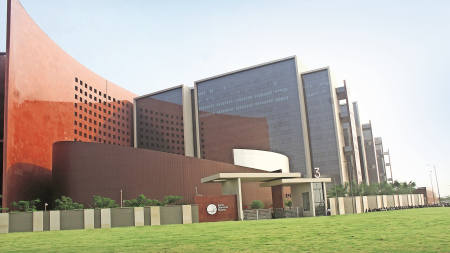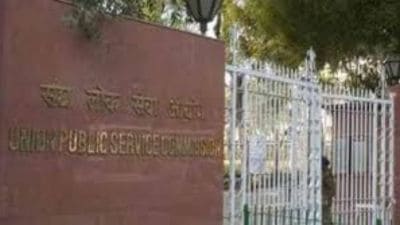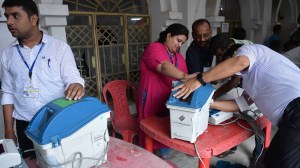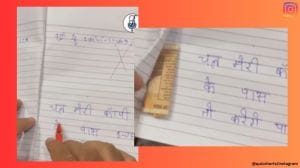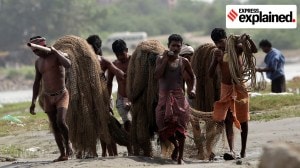- India
- International
Gujarat: Rushed back to village, but don’t know what we will do here, say migrant labourers
With small land-holdings, hilly terrains, water scarcity and parched lands, farming is neither profitable nor a dependable source of income in many villages.
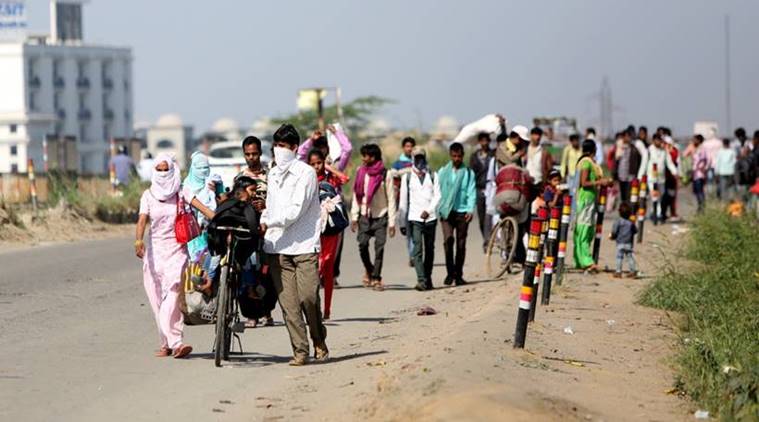 Migrant labourers, carrying their belongings, walk several hundred kilometers from cities to reach their towns/villages (Express Photo by Gajendra Yadav)
Migrant labourers, carrying their belongings, walk several hundred kilometers from cities to reach their towns/villages (Express Photo by Gajendra Yadav)
The ardous journey is not just what migrant labourers, who are returning in thousands from cities to their villages amid an unprecedented nation wide lockdown in view of the coronavirus pandemic, are facing. Deeper economic uncertainties stare at many of them back in their villages.
Sukhlal Solanki, 32, started his journey to Jhabua in Madhya Pradesh from Junagadh, where he worked as a contractual labourer, along with his wife, two children, his younger brother and his family after they were out of work for 10 days and ran out of food and money. Back in their village, they can stay at home with their elderly parents but they are uncertain about how they will sustain for the next two weeks till the official lockdown lasts.
“We have less than half an acre of land in our village and it is cultivable only during monsoon. Rest of the year, we can’t grow anything due to lack of irrigation facilities and water availability. We have rushed back to our village, but we don’t know what we will do here. It’s just that we are back home with our parents. The additional expenses have eased. Even the bare minimum expenses will be comparatively lesser here than in the cities. There is food at home to feed 10 of us for now, but we don’t know what to do if we run out of food here as well,” Solanki told this paper.
With small land-holdings, hilly terrains, water scarcity and parched lands, farming is neither profitable nor a dependable source of income in many villages. This has over the years forced many villagers from Gujarat and MP to migrate to urban centres and work as contractual labourers who spend as many as eight months away in the cities living in temporary trampoline tents and surviving on daily wages.
As part of the lockdown to control the spread of coronavirus, public transport, airlines and construction work were stopped last week, bringing most of the economic activities to a grinding halt and leaving millions of workers from the informal sectors out of work, forcing them to travel hundreds of kilometres on foot to reach their villages.

On March 27, the Centre rolled out a relief package of Rs 1.7 lakh crore under the Prime Minister Gareeb Kalyan Yojana, to limit the economic damage caused by COVID-19 and to provide financial safety for millions of poor hit by the lockdown. “We do not know when the amount will be transferred. Till it is transferred, we will continue to live on the edge with no clue about how to sustain further,” Solanki added.
In Hangela village of Dahod taluka, a family of 11 has been surviving on the wheat they harvested to sell in the market but could not after the APMC markets were shut down. Sumo Makhodia (29) who worked as a contractual labourer in Surat, returned home the very next day as the lockdown was announced.
“We don’t know what to do next. Every morning at 7 am, we travel 17 km to buy vegetables. The children can’t survive on just chapatis. My brother’s wedding was earlier this month and a lot of our savings were used up. Generally I stay at least a week beyond Holi but I had returned to work immediately after as we had almost exhausted our savings for the wedding. I hardly worked for five days during my stay in Surat,” Makhodia said.
“We harvested around two quintals of wheat from our farm close to our house. We were expecting around Rs 10,000 for the produce. But the APMCs were shut down and we cannot sell it either. With summer approaching, there will be water scarcity as well. If there is no proper irrigation, we will have no income,” he added.
Muniben Dahama, 34, from Dudhiya village in Limkheda taluka of Dahod, says, “My children were in the village with my parents-in-law as my husband and I worked as contractual labourers in Vadodara. We had to return home there was no option. There was no work and when we learnt that there was going to be no work for 21 more days, there was no point staying back in the city. We have a small farm close to the house. Our house is on a hilly terrain. Until last monsoon, we hardly cultivated anything due to lack of water and summer is not option. Now we might have to spend the entire summer season here and we do not know what to do. We have some savings, but there is no source of income here. Our children should be fed, we can still survive.”
About the relief package, Dahama said, “When they will transfer we will see, till then we are on our own, our survival is on us.”
Here’s a quick Coronavirus guide from Express Explained to keep you updated: What can cause a COVID-19 patient to relapse after recovery? | COVID-19 lockdown has cleaned up the air, but this may not be good news. Here’s why | Can alternative medicine work against the coronavirus? | A five-minute test for COVID-19 has been readied, India may get it too | How India is building up defence during lockdown | Why only a fraction of those with coronavirus suffer acutely | How do healthcare workers protect themselves from getting infected? | What does it take to set up isolation wards?
Apr 16: Latest News
- 01
- 02
- 03
- 04
- 05





